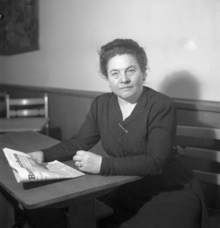Frieda Nadig
Friederike Nadig (11 December 1897 – 14 August 1970) was a German politician of the Social Democratic Party (SPD). One of the four women members of the Parlamentarischer Rat who drafted the Basic Law for the Federal Republic of Germany in 1948/49, she was one of the Mothers of the Basic Law.

Life
Friederike Charlotte Louise Nadig was born in Herford on 11 December 1897. Her father Wilhelm Nadig, a joiner,[1] was a SPD politician who served in the Landtag of Prussia from 1919 to 1931.[2] Her mother Luise Henriette Friederike Drewes was a seamstress.[1] After being educated at a Bürgerschule, Nadig completed vocational training as a sales clerk at the Konsumverein Herford co-operative and worked as saleswoman from 1914 to 1920.[3] From 1920 to 1922 she studied at the Social Women's School of Alice Salomon in Berlin, where she qualified as a social worker.[3] From 1922, she was a youth social worker in the city of Bielefeld social office and volunteered in the Arbeiterwohlfahrt (Worker's Welfare), a social aid organisation.[1] In May 1933, Nadig was summarily dismissed from her job for "unreliability"[3][4] based on her "Marxist attitude"[5] and the Nazi Law for the Restoration of the Professional Civil Service.[1] After three years of unemployment and difficulties caused by the political reasons for her dismissal,[5] she found a position at the public health office of Ahrweiler in early 1936 and stayed there until the end of the war,[2] using her influence to protect people against Nazi euthanasia laws.[6][5]

In 1944/45, she was among those 2500 Ahrweiler residents who temporarily lived in the Silberbergtunnel, a tunnel (part of the never-finished Strategic Railway Embankment) in a nearby mountain that was used as shelter from Allied bomb attacks.[7] In 1946, after a query by Nadig, the city of Bielefeld annulled her 1933 dismissal,[5] but Nadig took a salaried position at the Arbeiterwohlfahrt Westfalen-Ost instead, where she was involved in the creation of retirement homes and childcare facilities. She retired from the Arbeiterwohlfahrt in 1966, as managing director of the regional office.[3] Nadig died in Bad Oeynhausen on 14 August 1970.[1][3]
Political career
Nadig became a member of the Arbeiterjugend (worker's youth) in 1914 and joined the SPD in 1916.[3] After gaining reputation as an expert for youth and women's issues within the regional SPD,[3] she was elected a member of the provincial diet of Westphalia in 1929 and again in 1933, shortly before the provincial diet was dissolved.[5] In the Nazi era, she was not allowed to be active politically.[3]
After the end of the war, Nadig helped rebuild the SPD in Bielefeld and in Ostwestfalen.[2][8] In 1947, she became a member of the British Occupation Zone's Zonal Advisory Council and was later elected member of the Landtag of North Rhine-Westphalia,[3] serving from 20 April 1947 to 17 June 1950.[9] In 1948, she was sent to the Parlamentarischer Rat in Bonn as a representative of North Rhine-Westphalia.[2]
Nadig was a member of the Bundestag from 1949 to 1961, winning election as first-past-the post candidate three times,[10] in the constituencies of Bielefeld-Stadt and Bielefeld-Halle.[2] Her main political work was on women's equality in marriage and family law.[3]
Influence on the Parliamentary Council
Nadig was one of only four women members of the Parliamentary Council,[11] the four "Mothers of the Basic Law".[12] She was one of 12 members of the Grundsatzausschuss, the committee responsible for foundational principles.[13][14] She and Elisabeth Selbert were instrumental in having equal rights for women included in the Basic Law, and it was Nadig who proposed the SPD amendment motion to include the sentence "men and women have equal rights"[12] in the committee session on 30 November 1948. It was rejected by the committee on that day and by the Hauptausschuss, the coordinating committee, on 3 December 1948.[5] Selbert and Nadig organised a wide-ranging protest of women across German society, and a large number of letters and resolutions by women and women's organisations reached the Parliamentary Council.[15] The coordinating committee then passed the equal rights amendment unanimously on 18 January 1949.[5] Nadig attempted to explicitly include the right to equal pay, but the coordinating committee decided this was already implicit in the equal rights statement,[16] however, this turned out not to be the case in practice.[5]
Nadig also attempted to guarantee equal rights for children born out of wedlock[13] and worked to secure the right for conscientious objection in the Basic Law.[17][18]
References
Footnotes
- BMFSJ 2019, p. 9.
- Strotdrees 2009.
- Haunhorst & Trösch.
- Schmitt 2009.
- Notz 2011.
- Janta.
- Schmitt 2019.
- Lange.
- Nordrhein-Westfalen.
- Feldkamp 2019, p. 47.
- Heimgartner 2006, p. 231.
- BMFSJ 2019, p. 7.
- Feldkamp 2019, p. 69.
- BMFSJ 2019, p. 11.
- Ruhl 1994, p. 224.
- Feldkamp 2019, p. 74.
- Bernhard 2009, p. 28.
Bibliography
- Bernhard, Patrick (16 December 2009). Zivildienst zwischen Reform und Revolte: Eine bundesdeutsche Institution im gesellschaftlichen Wandel 1961-1982 (in German). Oldenbourg Verlag. ISBN 978-3-486-59523-9.CS1 maint: ref=harv (link)
- BMFSJ, ed. (2019). Mütter des Grundgesetzes (in German) (13th ed.). Berlin: Bundesministerium für Familie, Senioren, Frauen und Jugend, Referat Öffentlichkeitsarbeit.CS1 maint: ref=harv (link)
- Feldkamp, Michael F. (15 April 2019). Der Parlamentarische Rat 1948–1949: Die Entstehung des Grundgesetzes (in German). Vandenhoeck & Ruprecht. ISBN 978-3-647-10565-9.CS1 maint: ref=harv (link)
- Haunhorst, Regina; Trösch, Sven. "Biografie Frieda Nadig". Lebendiges Museum Online (in German). Stiftung Haus der Geschichte der Bundesrepublik Deutschland. Retrieved 24 February 2020.CS1 maint: ref=harv (link)
- Heimgartner, Arno (2006). Face of Research on European Social Development. LIT Verlag Münster. ISBN 978-3-8258-8984-5.CS1 maint: ref=harv (link)
- Janta, Leonhard. "Frieda Nadig". www.kreis-ahrweiler.de. Retrieved 24 February 2020.CS1 maint: ref=harv (link)
- Lange, Prof Dr Erhard H. M. "Friederike Nadig (SPD) | bpb". bpb.de (in German). Retrieved 24 February 2020.CS1 maint: ref=harv (link)
- Nordrhein-Westfalen, Landtag. "Landtag NRW: Detailansicht der Abgeordneten Friederike Nadig". www.landtag.nrw.de (in German). Retrieved 24 February 2020.CS1 maint: ref=harv (link)
- Notz, Gisela (31 May 2011). "Female Social Democrats on the Parliamentary Council". Forum Qualitative Sozialforschung / Forum: Qualitative Social Research (in German). 12 (2). doi:10.17169/fqs-12.2.1666. ISSN 1438-5627.CS1 maint: ref=harv (link)
- Ruhl, Klaus-Jörg (1994). Verordnete Unterordnung: berufstätige Frauen zwischen Wirtschaftswachstum und konservativer Ideologie in der Nachkriegszeit (1945-1963) (in German). Oldenbourg Verlag. ISBN 978-3-486-56072-5.CS1 maint: ref=harv (link)
- Schmitt, Günther (23 March 2009). "Eine Frau der ersten Stunde". General-Anzeiger (in German). Retrieved 24 February 2020.CS1 maint: ref=harv (link)
- Schmitt, Günther (4 May 2019). "Schutz vor den Nazis in Ahrweiler: Grundgesetz trägt auch Frieda Nadigs Handschrift". General-Anzeiger (in German). Retrieved 24 February 2020.CS1 maint: ref=harv (link)
- Strotdrees, Gisbert (1 August 2009). "„Mütter", die kaum einer nennt" (in German). Retrieved 24 February 2020.CS1 maint: ref=harv (link)
- Wissenschaftlicher Dienst des Deutschen Bundestags (1998). "Deutscher Bundestag: Web-Archiv". webarchiv.bundestag.de. Retrieved 25 February 2020.CS1 maint: ref=harv (link)